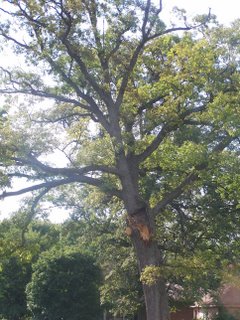Phillippians
This is not my favorite part of the Bible, simply because contentment is an unfinished issue in my life. By nature I am a restless spirit and I simply have to work at contentment, and accepting what the Lord has for me at any given point in time. One of the things that drives me nuts is that the Lord gave me eyes that can see the possible and a spirit that wants to get there right now. Such is my ministry preparation. I'm pushing 40, enrolled in Asbury Seminary, and have all sorts of great ideas. But, as the chorus goes, "In His Time", is not matching up with my time.
Last week we bid farewell to our closest friends, the Risters, as they packed up and moved to
Envious that God had opened a door for John where Ford Motor Company offered him a buyout that includes paying for his education. Envious that they get to move to one of the most beautiful places that I have ever been. And envious that their sense of direction seems stronger than mine.
But I know what God has asked me to do, and I continue to prepare for whatever he has in store for us. I rejoice in the Rister's sense of purpose. And for the way God has opened doors for them. Pray that I can be patient enough to wait on his time. I know He has doors to open for me.
Tuesday, August 22, 2006
Contentment
Sunday, August 20, 2006
A Big Day

Saturday, August 20, was a memorable one for our household. Bandit, our 7 month-old puppy, decided to make his bid for freedom around 1 p.m. He dug under the downspout extension, and crawled out a 6-inch gap and took off. Mind you, the night before he had broken the ring that held his tag and dog license. So he was completely footloose and fancy free.
My wife called me at the office to see if I had the dog and then discovered the escape. When I arrived at home my wife, daughter and daughter's friend were out riding their bikes and calling Bandit's name.
From about 2 p.m. until 7:30 we continued looking for him, broken only long enough to attend an open house for a couple that eloped in June. As the day wore on, my attitude toward this moronic mutt became progressively less charitable, especially as I tired of sitting on a bicycle seat.
Our break came around 7 when a lady said she had seen him downtown on Front Street. I rode down and went into a restaurant to see if they had seen him. It turns out that they had seen him running in and out of traffic and tried to tie him up. When that failed, they took him to a nearby park where the Monroe Fire Department was holding a children's event. A kind fireman took him to the Humane Society, where we picked him up the next day. Many thanks to Julie and her staff at the Monroe Street Grill and the Monroe Fire Department for taking care of our wayward canine.
But as my attitude darkened, the Lord reminded me of the parable of the lost sheep in Luke 15:4: "Suppose one of you has a hundred sheep and loses one of them. Does he not leave the ninety-nine in the open country and go after the lost sheep until he finds it? I have never lost a sheep, heck, I don't even like sheep. But I do know that in the bottom of my heart, I was sick with the thought that he might be hurt, dead or taken. And I'm really glad to have him back.
If I can be that happy about my wayward dog, how much more joy is there in heaven when a wayward soul returns home? And how do I put that joy in my heart for the souls that return? That is where I need God's grace to celebrate with others. I get so caught up in my own world that I don't appreciate what God is doing around me. Just what he has done for me lately.
Thursday, August 10, 2006
Here we go again
In my recent Christian Ethics class, we had to think through some tough just war theory applications. Terrorism is a tough one. The war is always asymmetrical, the opponents aren't easily identified, and often to remove them, you have to attack a failed state that is harboring them.
God help us as we go forward. This is going to go on for a long time.
Wednesday, August 09, 2006
Too much time on their hands
It seems the link is password protected. Here is the article from the August 9 Wall Street Journal.
Naming a State Dirt
Just Doesn't Wash
With New Jerseyites
Can't Get Senate Notice;
Enemy of Lawn and Order
August 9, 2006; Page A1
TOMS RIVER, N.J. -- As its license plates affirm, New Jersey is the Garden State. Where does its garden grow? It grows in dirt, which is why asking the state legislature to designate an official New Jersey state dirt sounded like a nice idea to David Friedman.
"It connects plants and animals and water and everything," said Mr. Friedman, a tall 55-year-old who runs the Ocean County soil-conservation district, here on the coastal plain between New York and Atlantic City. On a hot afternoon, he was driving his Subaru toward the broad, burnt lawn of the East Dover Baptist Church.
"What's beneath our feet," Mr. Friedman continued, "is a whole other world of earth and worms and...help me out, Chris."
"And roots and organisms," said Chris Miller, a specialist with the U.S. Agriculture Department who was on an inspection tour; he was riding in the back seat.
"They all serve," Mr. Friedman said. "If we manage what's below our feet, it's going to benefit mankind."
The sentiment appealed to Douglas Fisher, chairman of the state Assembly's Agriculture Committee. Encouraged by Mr. Friedman, he co-sponsored a bill naming a sandy loam called Downer soil as New Jersey's official dirt. Also known as "sugar sand," Downer blankets Ocean County; it's the commonest dirt in the state.
By unanimous vote, the Assembly passed the bill in May, prompting local resident Jay Lomberk to write to the Asbury Park Press: "State dirt? Are you kidding?" And another local, Jackie Daly, to write: "If it weren't so pathetic, it would be funny." There were lots of editorials, too.
Mr. Fisher is sure the mockery explains why no senator followed his dirt bill with one in the state's upper chamber. Earlier this year, Mr. Fisher nominated the tomato as New Jersey's official vegetable. The tomato is a fruit, but Mr. Fisher cited a U.S. Supreme Court decision from 1893 to prove that tomatoes are vegetables in the eyes of the law.
"The tomato didn't go anywhere, either," he says. "Didn't even pass the Assembly. Legislators think these bills make them look stupid. You can reduce anything to folly if you keep working at it."
Hard at work across America, state legislatures have lately ordained official fossils, odes, dogs and doughnuts. Bob Akerle of Netstate.com, a Web site that tracks these bills, says his count of new proposals is nearing 60 for this year. Where official symbols once stopped at flags, flowers and anthems, they total in the hundreds now. A few months ago, South Carolina made boiled peanuts its official snack food. Hawaii just installed the humuhumunukunukuapua'a as its official fish.
United Square Dancers of America has lobbied Congress to make the square dance a national symbol, alongside the flag, the rose and the bald eagle. "What with the war, we were not able to pass it," says Alitia Becker, the group's Plains region vice president. But it has persuaded 31 state legislatures -- New Jersey's included -- that they need an official folk dance, and that the square dance is it.
Until July 1, only Vermont had an official pie (apple). Now Florida has passed a pie act (Key lime) and the American Pie Council has hopes for pecan (Georgia) and cherry (Michigan). "People like to invoke a feeling of America," says Linda Hoskins, the pie council's executive director. "Nothing invokes America like pie."
Sure enough, but even officialdom can get fed up. Florida's lawmakers saw no use for a state rock; Ocala limestone met defeat in April. Last month, Louisiana Gov. Kathleen Blanco vetoed the newly written "I Love My Louisiana" as state poem, citing its lack of literary merit. In March, the Utah Legislature killed the rattlesnake's bid for state reptile.
Unlike rocks, snakes and poetry, the official-dirt movement, a loose amalgam of soil scientists, had run into little resistance up to now. Florida named a dirt (Myakka) in 1989. West Virginia did it (Monongahela) in 1997, and Illinois (Drummer) in 2001. Georgia is getting set to name red clay. All told, 21 states have honored dirt.
"There's no financial motivation, like there is with pie," Mr. Friedman was saying as he drove up to the Baptist Church and parked at the curb. He opened his trunk, got out a rubber-handled steel spike and added: "I don't think this should be a controversial issue in New Jersey."
Except for one thing: Mr. Friedman's homage to Downer soil also happens to be a philosophical challenge to what federal researchers recently identified as America's biggest crop.
The lawn.
At the East Dover Baptist Church, the lawn, initially planted in Downer, was now parched and firm. Mr. Friedman started across, paused, and jammed the spike as deep as it would go into the surface crust. It stopped at two inches.
"This is what happens in suburbia," said his colleague, Mr. Miller. Like lawns everywhere, this one had been flattened and turned during construction before it was grassed over. When dirt gets crushed, grass can't sink roots deep enough to drink up water from below; it has to be watered by hoses and sprinklers more and more. Because the dirt can't absorb it all, the water runs off into drains. In Ocean County, lawn fertilizer is then sluiced into barrier-island bays, helping breed algae that can starve fish of oxygen.
By contrast, under a pine stand in a far corner of the church lawn, a patch of Downer had survived in its spongy, primordial state. Mr. Friedman walked over and easily drove his spike up to the handle. He cleared the leaf duff with his book and scooped up two handfuls of the fragrant, sandy loam. "Plenty of pore space," he said, and Mr. Miller added: "It's best as woodland, a natural woodland soil."
Once, Ocean County was almost all woodland, and its population included 2.6 million hens. It has 500,000 people now, most in houses with lawns, plus 93 gated subdivisions for retirees and more on the way.
"Lawns," said Mr. Miller from the back seat as Mr. Friedman drove west toward Lakehurst. "Personally, I don't know what the draw is." The Subaru passed a string of "active adult communities," their new houses standing on treeless greensward. "That's how they build," Mr. Friedman said. "They clear everything."
He stopped at the edge of a future old-age compound called "River Pointe." Banners with pictures of smiling couples hung from poles. Behind them lay 165 humpy, windblown acres. Root-rakers had pulled out the scrub oak and pitch pine. Graders had sheared off the topsoil and stockpiled it. A backhoe was digging a storm drain.
Two surveyors stood at the roadside. Mr. Friedman walked over to introduce himself and offer his views on lawn abuse. "That was Downer soil," he said, looking over his shoulder. "It no longer is."
"Unfortunately, I'm responsible for clearing this," said one of the surveyors, Doug Falkinburg. "That's progress."
Mr. Friedman brought up his legislative campaign, pointing out that New Jersey has a state bird (goldfinch), a state tree (red oak) and a state dinosaur (Hadrosaurus foulkii), but no state dirt, the thing that holds it all together. "People didn't see the value," he said, mentioning that Downer, which almost covers the southern half of the state, was the candidate.
As Mr. Friedman left, the surveyor watched silently, and then he gave the dirt a kick. "Hey, I'm a South Jersey guy, too," he called out. "You got my vote!"
Write to Barry Newman at barry.newman@wsj.com1
| URL for this article: http://online.wsj.com/article/SB115508792324430654.html |
Tuesday, August 08, 2006
Broken things

I was driving down M-50 toward church on Sunday and saw a big maple tree that had lost one of it's main branches. The site where the branch ripped out left a big ugly scar and a gaping hole in the tree, which sits in someone's front yard. My first thought was "why don't they cut that down, it looks nasty" but then the Lord began to speak to me.
I began to realize that while the tree was not what it once was, it was still extremely useful. It still provided shade, the gaping hole had birds transiting in and out of it, and probably nesting there, and all sorts of bugs and beetles are probably making that their home. Sure the tree isn't as pretty as it once was, but it still does some things very well.
People are like that too. Some are physically broken, like the tree. They have injuries or a lifetime of trauma that has left their body bent and broken. But they still have value and can add to the church and community with their contributions.
Others are emotionally or spiritually broken, and their wounds are not always obvious. But they are real. And we have to take them into account when dealing with people. I have not always been good at this, but it is an area where the Lord is working in my life right now.
By nature I am a pusher. I keep moving and prod people to keep moving. But I sometimes push too hard for where people are at that moment. The Spirit has been good to me lately in letting me know when to ease up, and I've been trying hard to listen.
Let's celebrate the broken things. Let's fix what we can, use what we can, throw away what we must and celebrate what we have. God uses broken things, and broken people. So can his church.
Tuesday, August 01, 2006
The Banquet
 I just finished watching Antwone Fisher, a touching story of a young man trying to find his family and his place in the world. Denzel Washington gives his usual superb performance, and Joy Bryant and Derek Luke are wonderful in their biggest roles to date.
I just finished watching Antwone Fisher, a touching story of a young man trying to find his family and his place in the world. Denzel Washington gives his usual superb performance, and Joy Bryant and Derek Luke are wonderful in their biggest roles to date.There is a scene near the end where Antwone is welcomed into a family he has never known (you have to watch the movie) and he is overwhelmed by the love shown to him. Everyone comes up to him, hugs him, claps his back and welcomes him into the family.
This reminds me of what heaven will be like. When a new person whom we never knew is welcomed into the Kingdom of God, he or she is welcomed with open arms and a great banquet is thrown. Matthew 22 talks about who will come to the banquet that the Lord has thrown. Antwone Fisher is the kind of person who will be invited - orphaned, abused, and neglected. Maybe that is why I had tears in my eyes as I watched this. God has such a tender heart for those who have been mistreated. Just read Amos.
And watch the movie. There is a lot of bad language, but that scene is priceless.


